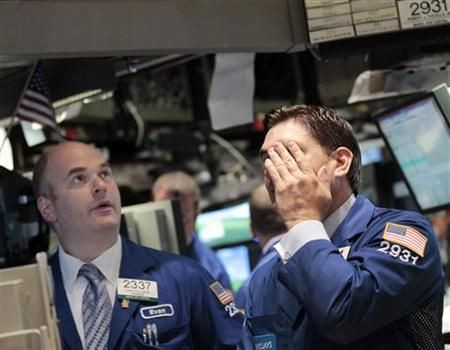How Will U.S. Markets React on Monday to S&P?s U.S. Debt Downgrade?

The stunning decision by Standard & Poor’s on Friday to downgrade the long-term credit rating of the United States government to AA+ from AAA will likely raise questions about investor confidence in the economy and throw equity markets into more turmoil.
The great unknown is, how will U.S. stocks (which have already been hammered over the past two weeks) respond to this shocking development? And will there be a long-term lingering impact on stock price performance going forward?
Part of the problem is that the downgrade (while perhaps not a total surprise) arrived somewhat unexpectedly – and during a period when markets are already in an extremely volatile and fragile state.
Sean M. Snaith, director of Institute for Economic at the University of Central Florida, said he was “surprised” by S&P’s downgrade, but “skeptical” about the possible motivations behind it.
“Wasn't [S&P] one of the rating agencies that declared the mortgage-backed securities that were at the heart of the financial crisis to be AAA, when they were far from it?” he pondered. “How much credibility do these agencies have at this point?”
George Goncalves, chief Treasury strategist for Nomura Americas, told CNBC: “I did not expect this [downgrade] to happen this soon… I really thought they'd take the two-stage approach and see how further [spending] cuts would come along."
Goncalves added: "In the moments in the past when large countries were downgraded, our analysis shows there is some volatility. It depends on the market conditions. I don't think given the environment we're in right now, this was the optimal time to be seeing a downgrade of the largest nation in the world. The only fear I have is that after a pretty rough week in the risk markets, how is this going to be perceived by investors?”
Among other issues the downgrade raises: what will happen to pension funds which are required to only hold AAA-rated securities? In the event they undertake a massive sell-off of Treasuries, bond yields would go through the roof.
Laura LaRosa, director of fixed income at Glenmede, an investment and wealth management firm in Philadelphia, told The Wall Street Journal: “[The downgrade is] a game-changer. With Europe in the situation that it is, adding the U.S. to the problem is just really bad for world financial markets."
She added: "People who are more focused on equities have said they were prepared for it. They said it was supposed to happen. But I think the bond market is not going to take it as easily as the equities guys will. Bond prices will go down."
However, Snaith does not expect Treasuries to respond in an “exaggerated fashion” to this development.
“What [has] changed fundamentally from Friday prior to when the downgrade occurred?”, he said.
He noted that “Treasury yields fell in the days leading up to the [government's] debt ceiling deadline and when the Dow fell by 500 points - not exactly a sign of investors in Treasuries heading for the door.”
Indeed, some analysts think that the downgrade may already have been priced into the market (there were rumors that the downgrade was coming as early as Friday afternoon, which led to a huge stock sell-off later that trading session).
Christian Thwaites, president and chief executive at Sentinel Investments, told The Journal: "It'll be business as usual come Monday. This has been well priced in. S&P had been talking for a while about this. Their credibility has certainly taken a hit, so they obviously felt a need to follow through."
But Snaith adds that some investment funds which are tied to S&P ratings and required to hold AAA-bonds may witness some “portfolio adjustments.”
And what about the trillions of dollars of U.S. Treasuries held by foreign governments?
Snaith indicated that more than 78 percent of foreign treasury holdings are "foreign official" meaning they’re held by the Central Bank of the country.
“These holdings are typically driven by foreign exchange market intervention rather than portfolio considerations,” he said. “Despite the wailing and gnashing of teeth, a sell-off of Treasuries by these countries would undo what these purchases were intended to do -- prevent appreciation of their currencies against the U.S. Dollar.”
© Copyright IBTimes 2024. All rights reserved.





















